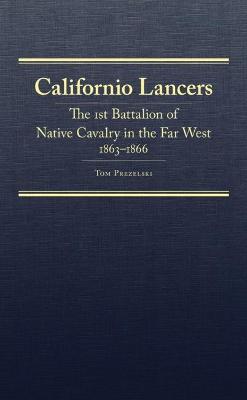Frontier Military
1 total work
More than 16,000 Californians served as soldiers in the Union Army during the Civil War. One California unit, the 1st Battalion of Native Cavalry, consisted largely of Californio Hispanic volunteers from the ""Cow Counties"" of Southern California and the Central Coast. Out-of-work vaqueros who enlisted after drought decimated the herds they worked, the Native Cavalrymen lent the army their legendary horsemanship and carried lances that evoked both the romance of the Californios and the Spanish military tradition. Californio Lancers, the first detailed history of the 1st Battalion, illuminates their role in the conflict and brings new diversity to Civil War history.
Author Tom Prezelski notes that the Californios, less than a generation removed from the U.S.-Mexican War, were ambivalent about serving in the Union Army, but poverty trumped their misgivings. Based on his extensive research in the service records of individual officers and enlisted men, Prezelski describes both the problems and the accomplishments of the 1st Battalion. Despite a desertion rate among enlisted men that exceeded 50 percent for some companies, and despite the feuds among its officers, the Native Cavalry was the face of federal authority in the region, and their presence helped retain the West for the Union during the rebellion. The battalion pursued bandits, fought an Indian insurrection in northern California, garrisoned Confederate-leaning southern California, patrolled desert trails, guarded the border, and attempted to control the Chiricahua Apaches in southern Arizona.
Although some ten thousand Spanish-surnamed Americans served during the Civil War, their support of the Union is almost unknown in the popular imagination. Californio Lancers contributes to our understanding of the Civil War in the Far West and how it transformed the Mexican-American community.
Author Tom Prezelski notes that the Californios, less than a generation removed from the U.S.-Mexican War, were ambivalent about serving in the Union Army, but poverty trumped their misgivings. Based on his extensive research in the service records of individual officers and enlisted men, Prezelski describes both the problems and the accomplishments of the 1st Battalion. Despite a desertion rate among enlisted men that exceeded 50 percent for some companies, and despite the feuds among its officers, the Native Cavalry was the face of federal authority in the region, and their presence helped retain the West for the Union during the rebellion. The battalion pursued bandits, fought an Indian insurrection in northern California, garrisoned Confederate-leaning southern California, patrolled desert trails, guarded the border, and attempted to control the Chiricahua Apaches in southern Arizona.
Although some ten thousand Spanish-surnamed Americans served during the Civil War, their support of the Union is almost unknown in the popular imagination. Californio Lancers contributes to our understanding of the Civil War in the Far West and how it transformed the Mexican-American community.
